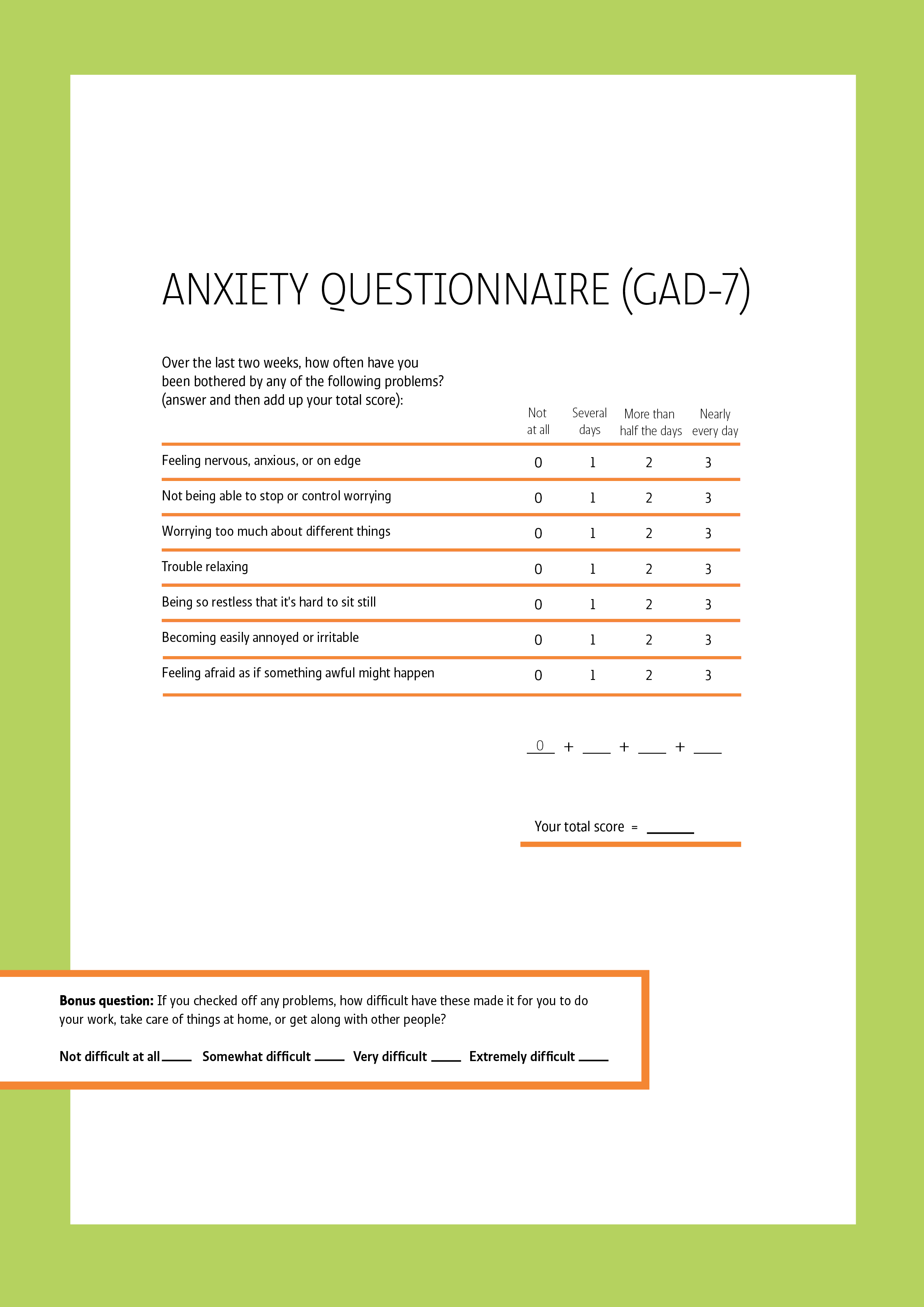2. Anxiety - Anxiety Questionnaire
Topic Index
Anxiety Questionnaire
How is Anxiety affecting your life? Doctors use this seven-question test to measure several different anxiety disorders. After answering the questions, you can learn what the results mean in the article below. Show a copy of the completed quiz to your doctor or mental health professional. He or she can learn even more from your answers, and help you get the treatment you need.

What does your score mean?
Use the categories below to score your results and get a better idea of how anxiety is impacting your life. Keep in mind, though, that while this questionnaire is a great tool for monitoring your symptoms, it doesn't replace a diagnosis from a doctor or mental health professional. Show your completed questionnaire to your doctor so she or he can help you best understand your results. Your doctor can also help rule out other medical conditions that might be causing your symptoms before diagnosing you with an anxiety disorder. And no matter your score, pay attention to how you answered the bonus question. If anxiety is heavily impacting your life, treatment can help.
0-4: No anxiety disorder
If you scored less than five on this questionnaire, then we have good news. Your anxiety is probably in the normal range. You probably feel anxious sometimes, since anxiety is a normal part of life, but you most likely don't have an anxiety disorder. If you're feeling more stressed than you'd like, though, the tips in this booklet series can still help you to manage your daily stresses and feel more relaxed. If your score doesn't seem right to you, though, listen to your gut. Make an appointment with your doctor to discuss your specific situation.
5-9: Mild anxiety disorder
A score in this range means your anxiety is mild, from a clinical perspective, but it's still weighing you down. You go through your day with all kinds of extra worries and fears. It might seem like there's no way to avoid those anxious thoughts, but don't give up hope. You can learn to manage your anxiety. Make sure your doctor knows how you're feeling so that he or she can monitor your condition. Plus, follow the tips in these booklets, especially issues 5-7, for advice on managing your symptoms. Hang in there!
10-14: moderate anxiety disorder
With a score in this range (or as low as 8 for people with panic disorders, social anxiety, or PTSD), anxiety is probably affecting you every day. It's chasing you, filling your head with worries, and interfering when you're trying to live your life. Some people may not understand the cloud of worries that you're fighting every day, but we see you. And we're proud of you for reading this booklet – it's a step to feeling better. Make an appointment with your doctor to talk about the best treatment. She or he may recommend that you see a mental health professional. The advice in this booklet series can help, too, along with your treatment, of course. Congratulations on starting to take back your life!
15 or more: Severe anxiety disorder
Worries and fears are like a wall, and they're blocking you from the life you want to live. You're spending so much energy dealing with those anxious thoughts that it leaves you exhausted all day long. You're very brave for how long you've carried this with you, and even braver to pick up this booklet. You are stronger than your anxiety – strong enough to reach out for treatment, and strong enough to take back your life. Follow the tips listed for moderate anxiety disorder above, and don't give up if results take time. With treatment and patience, you can feel better.
